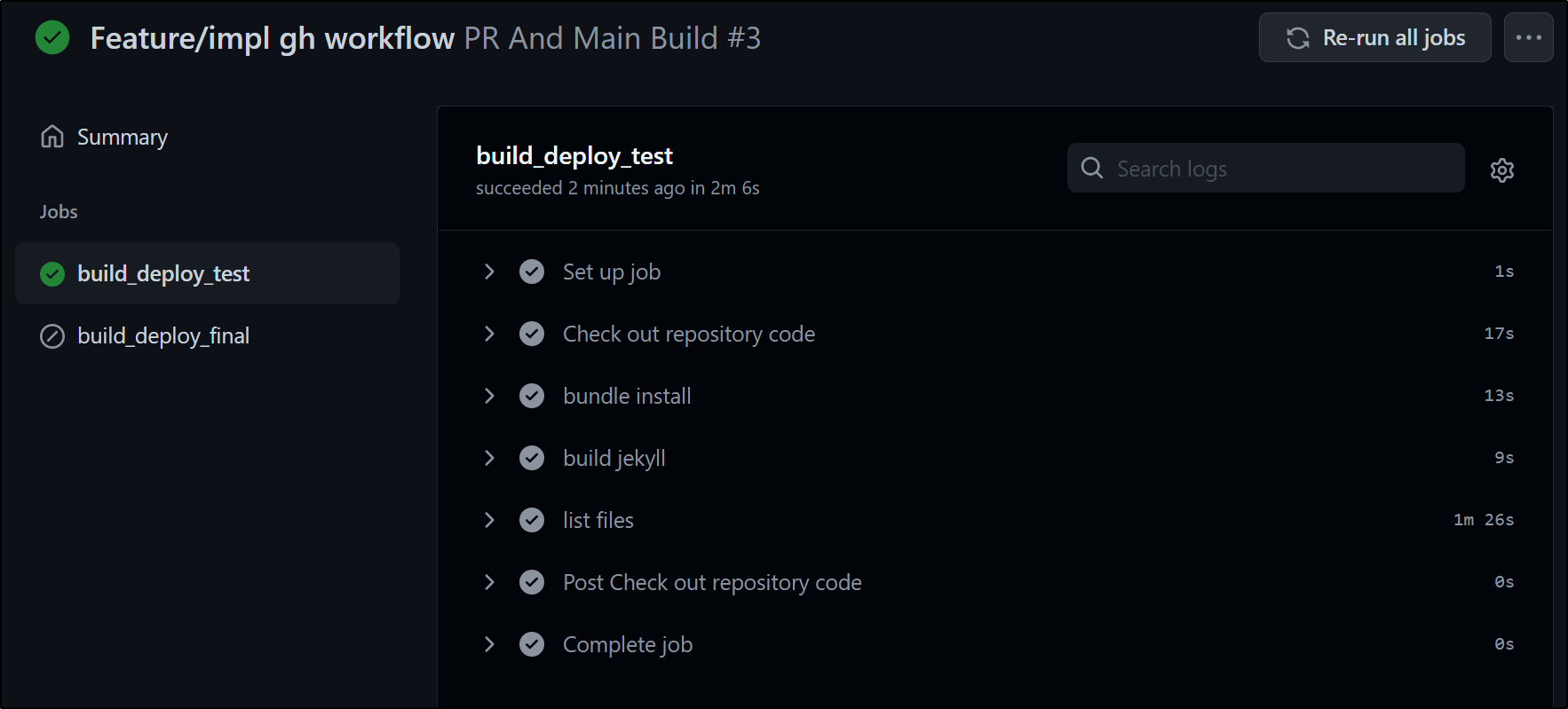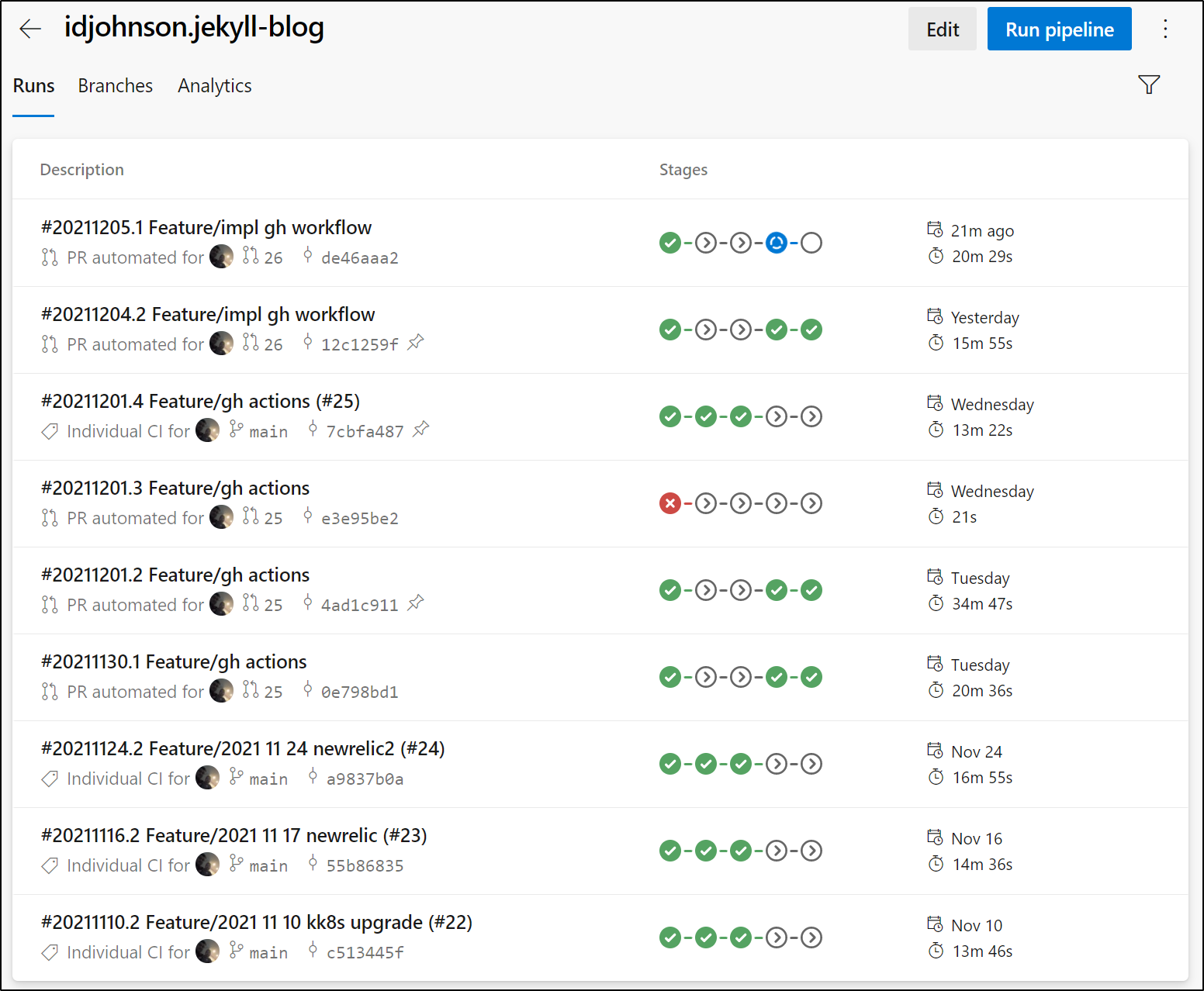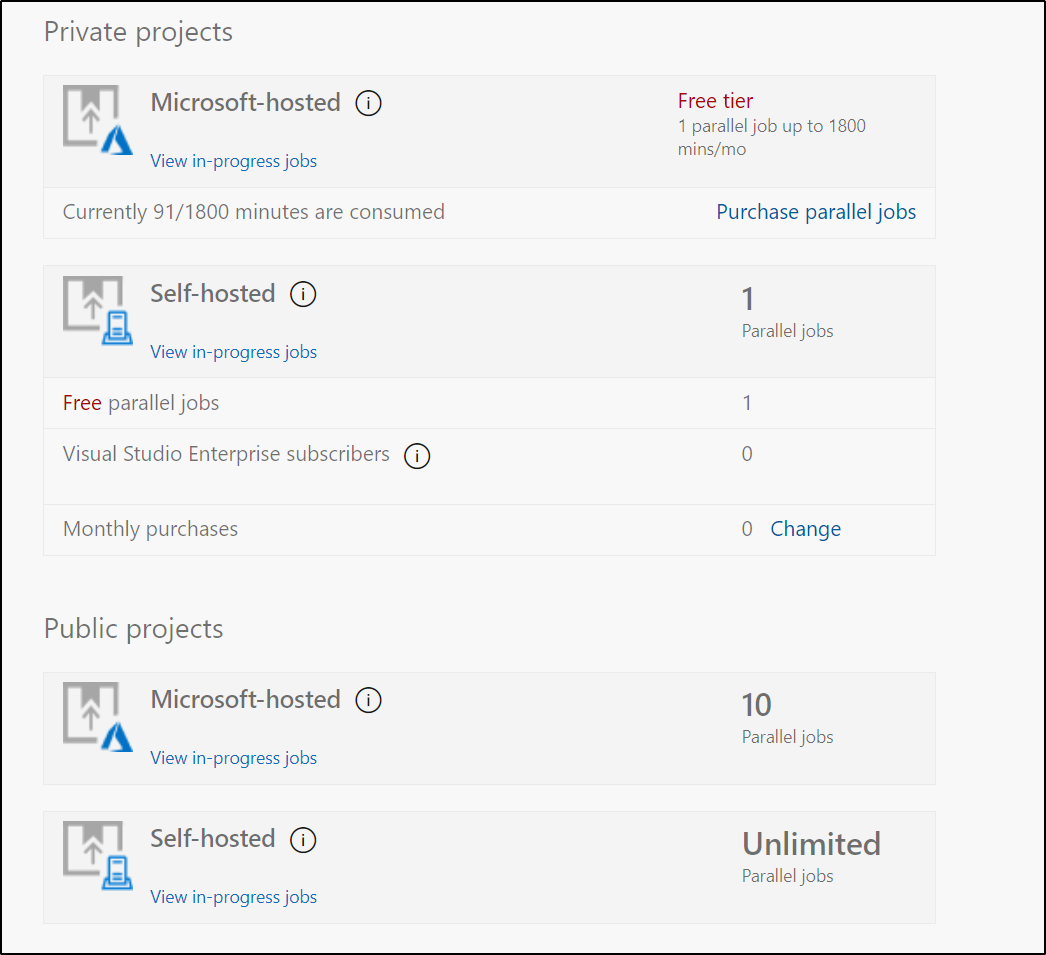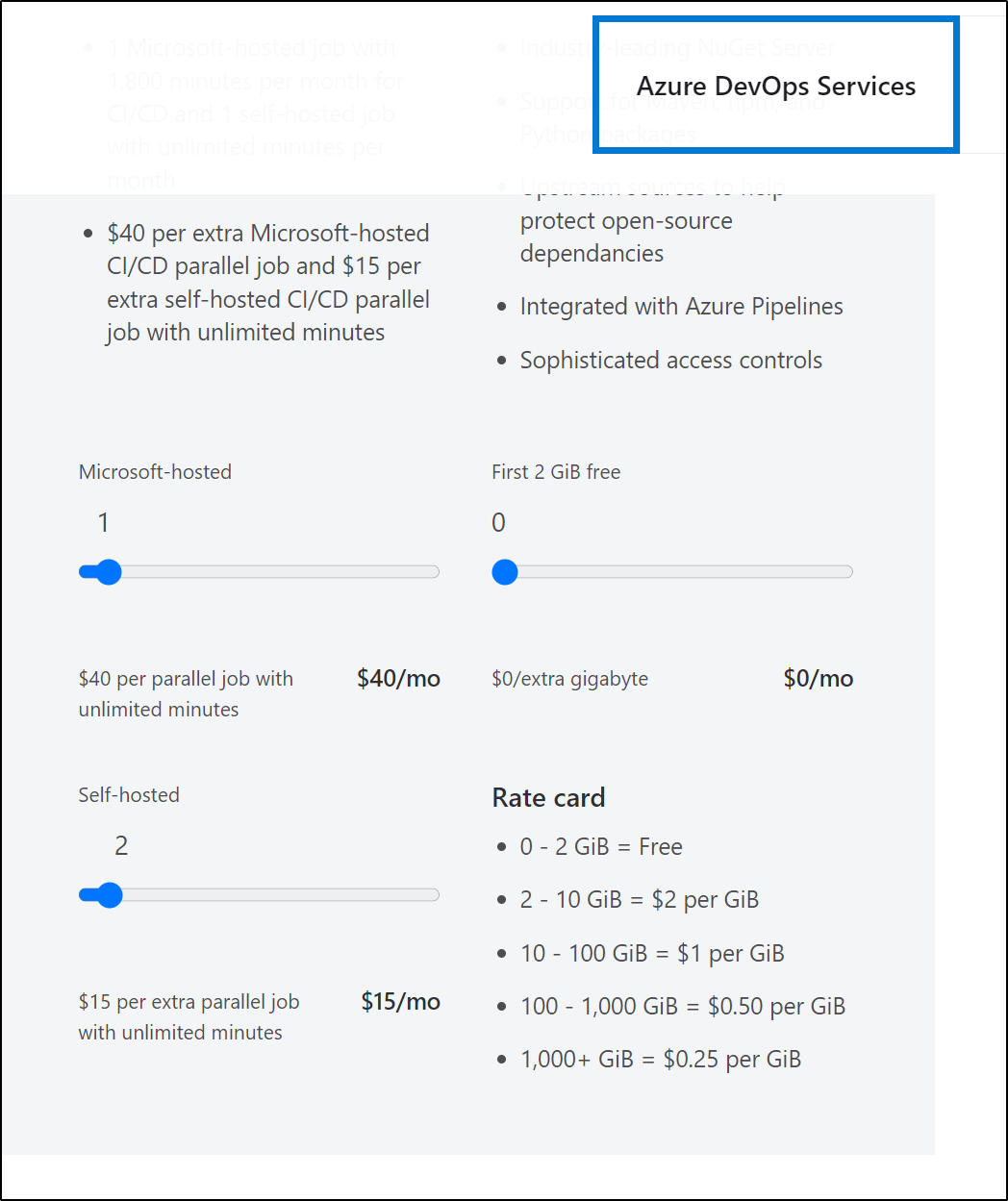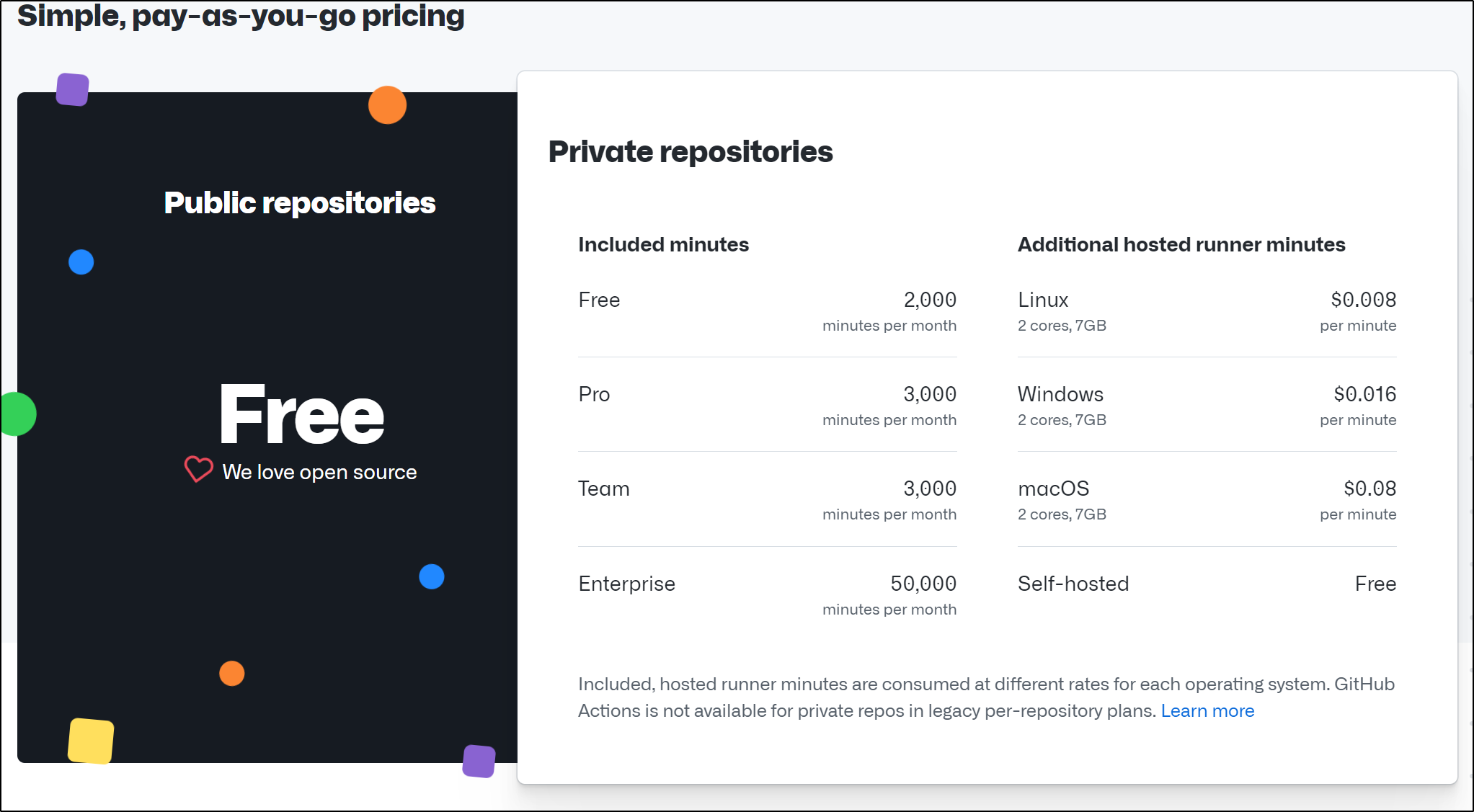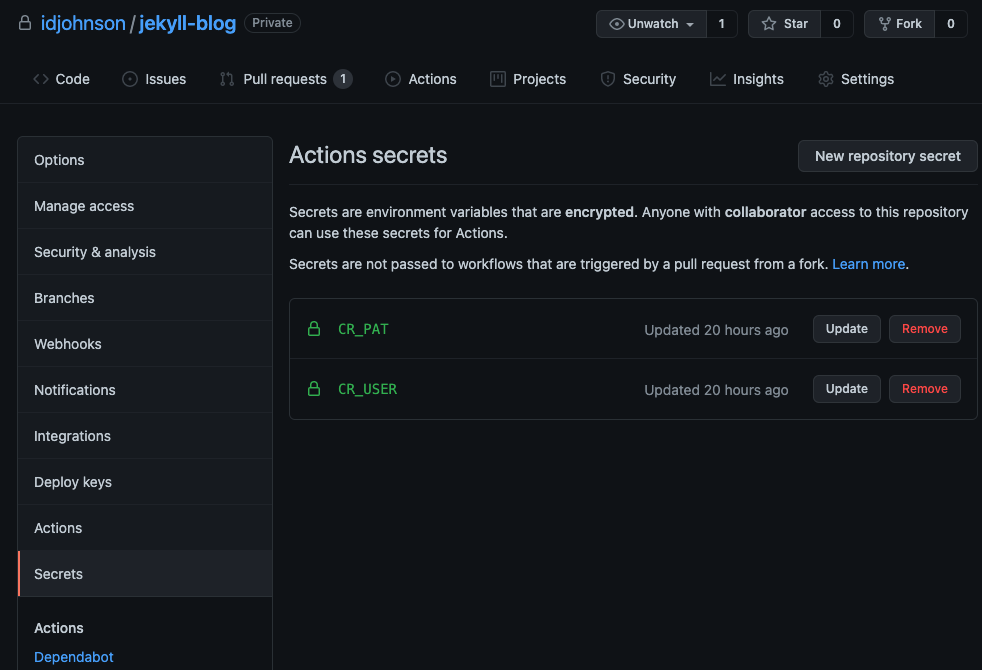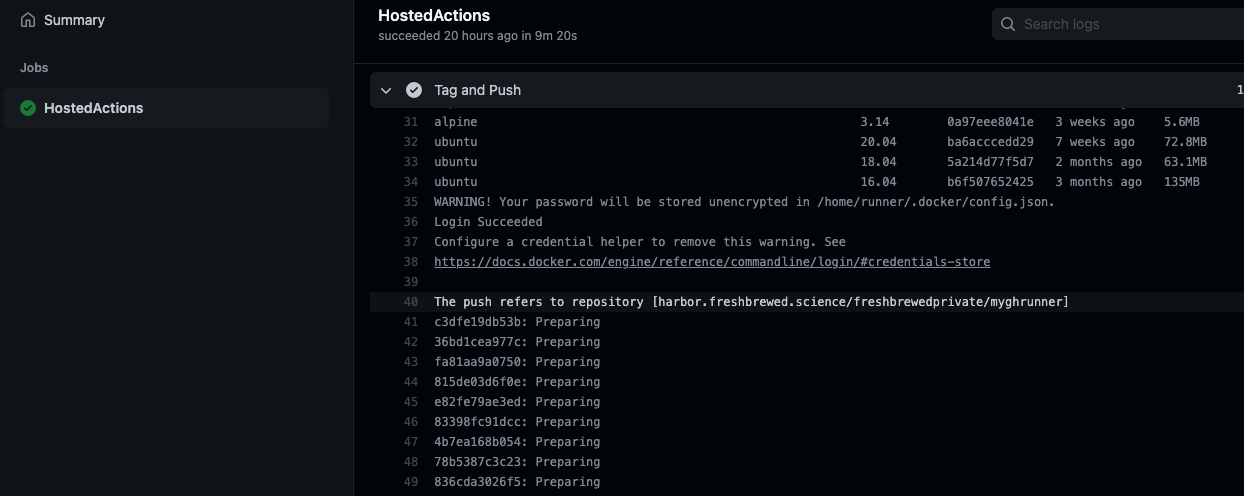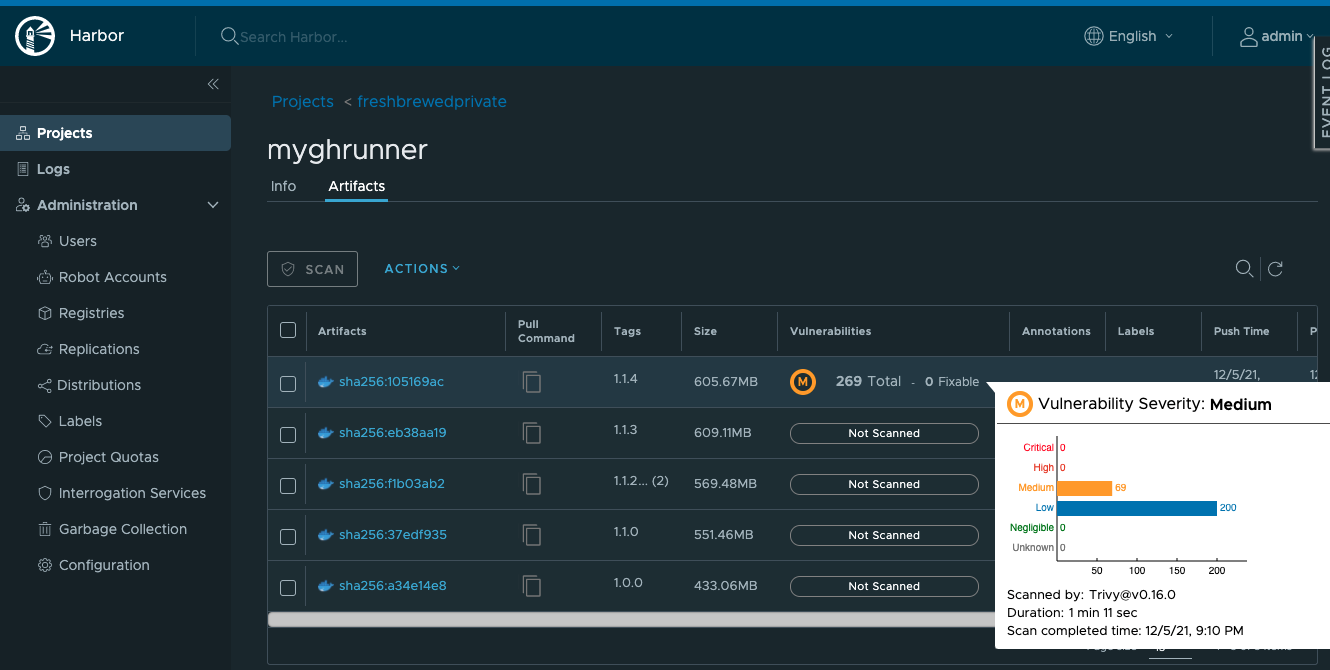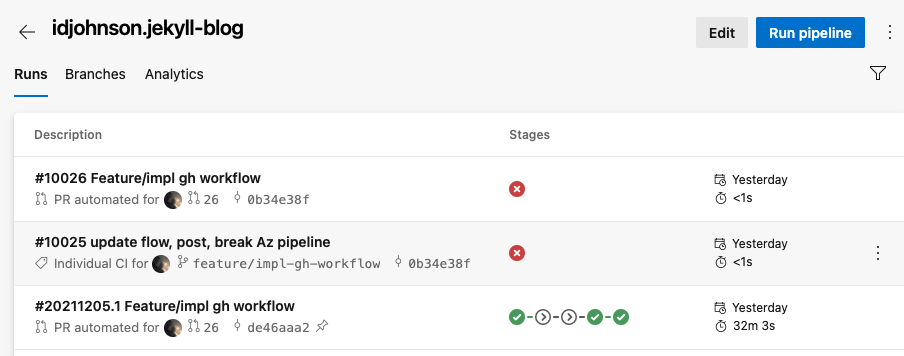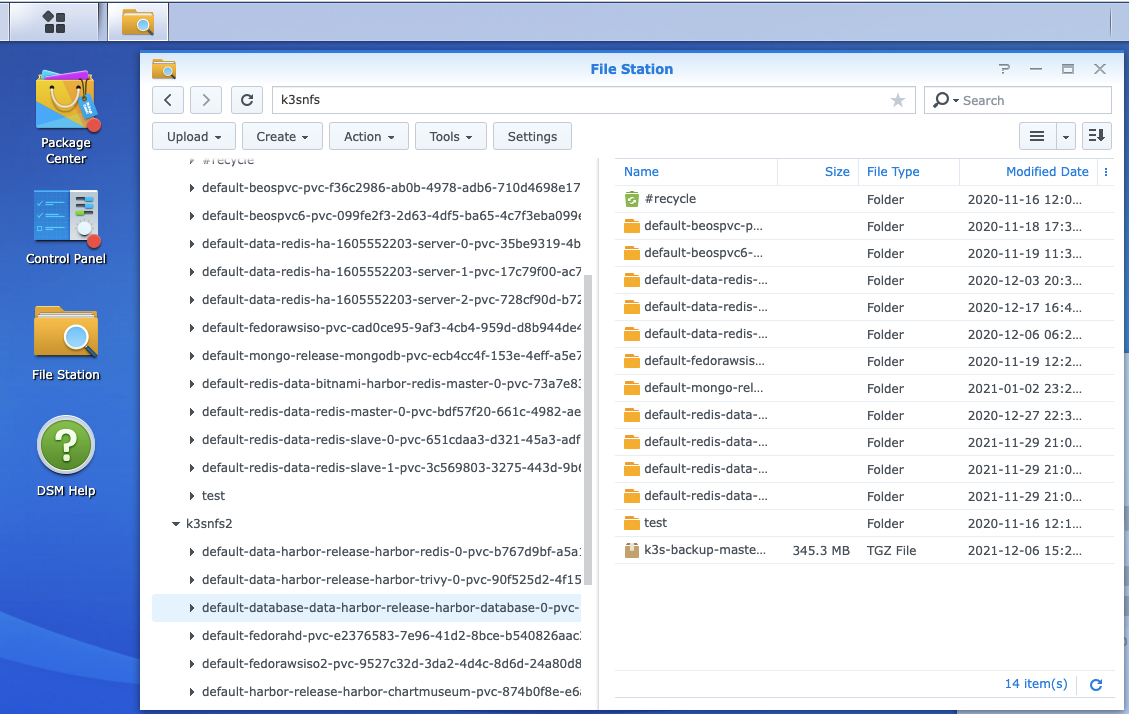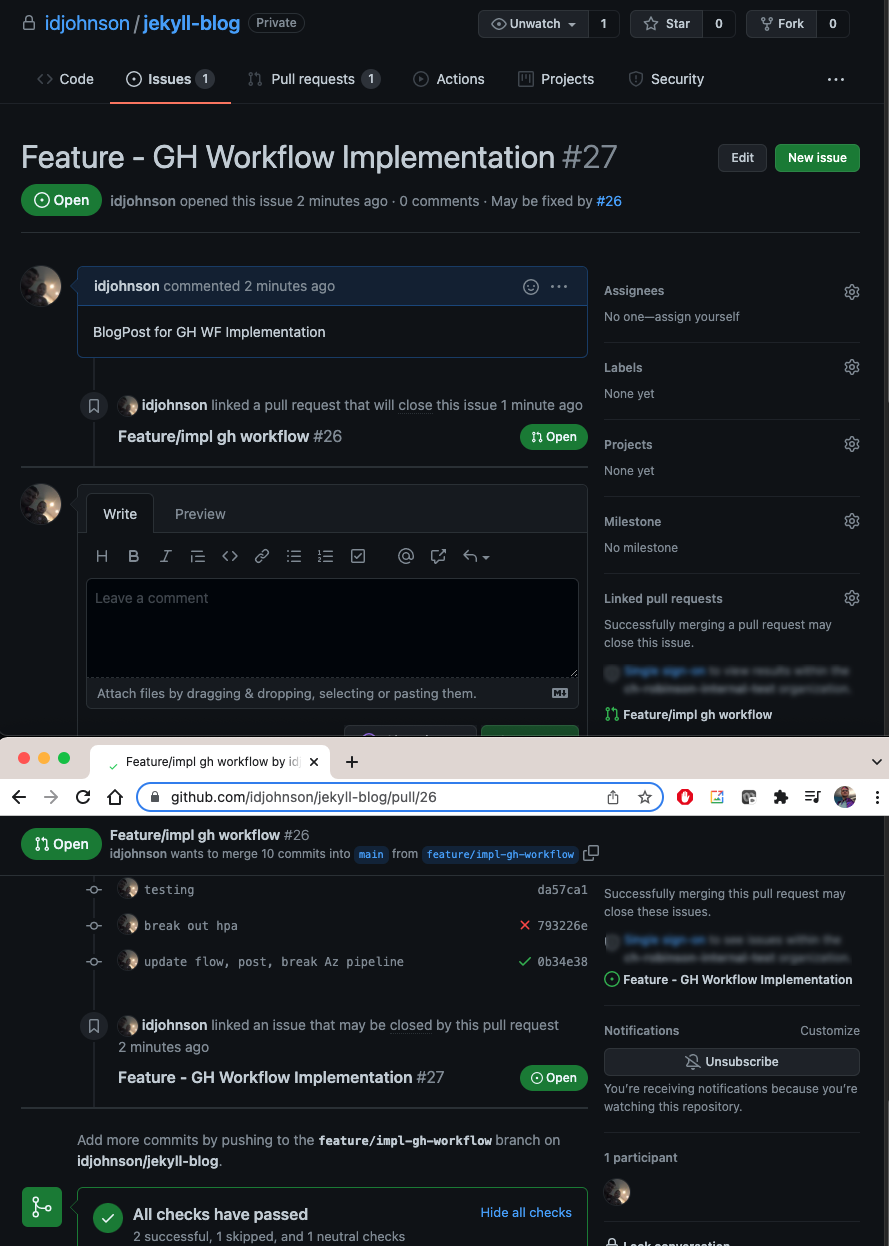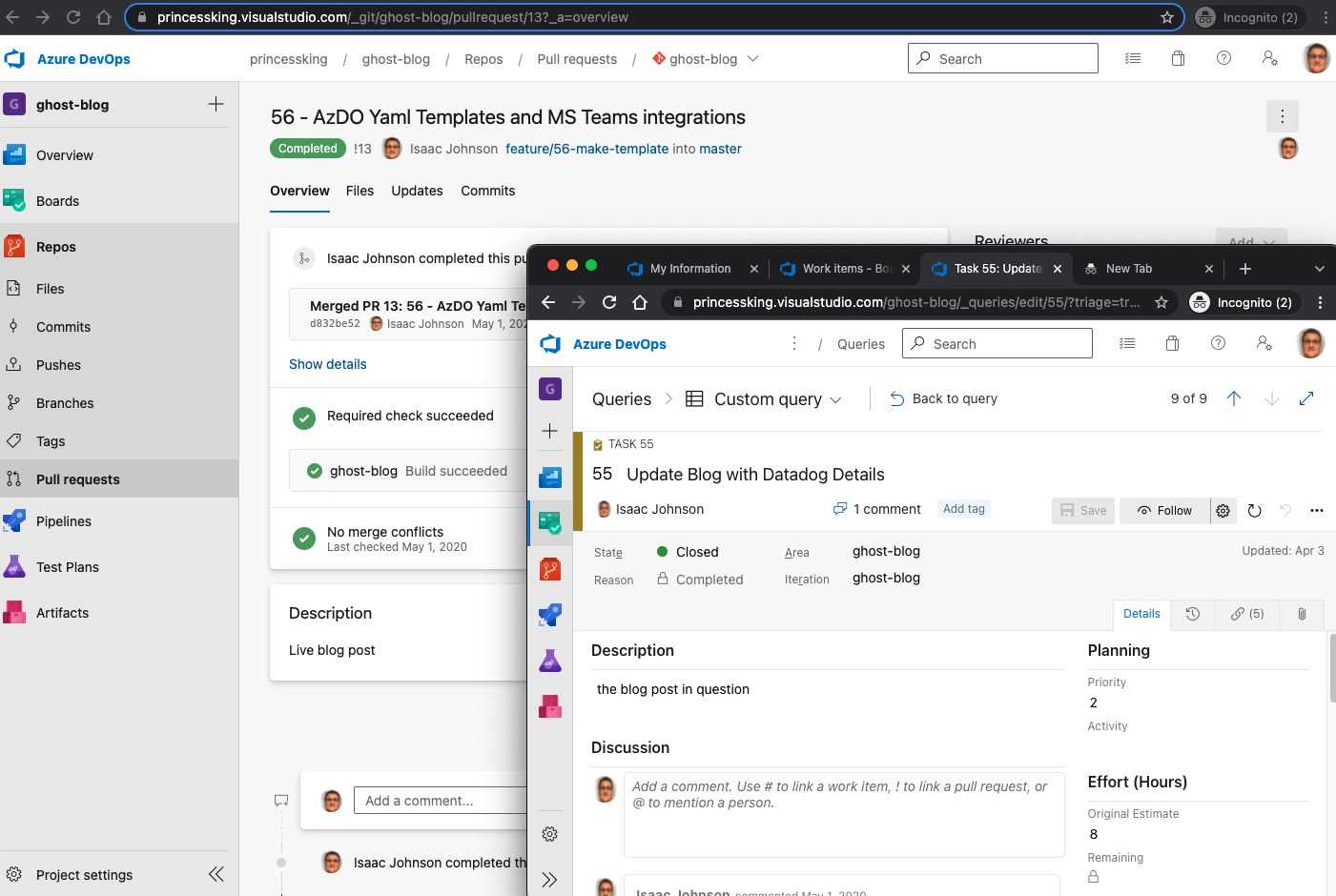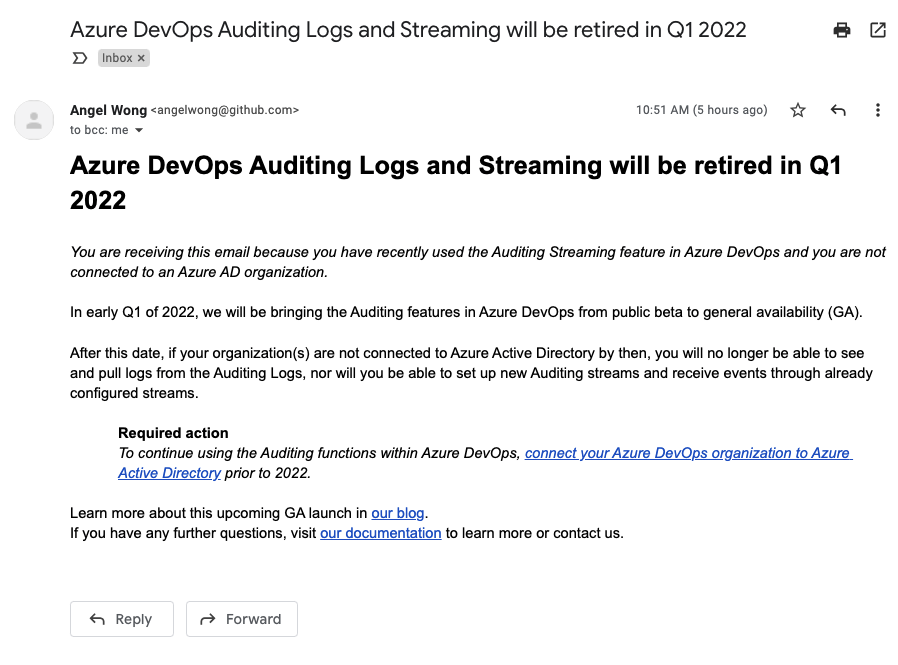Published: Dec 7, 2021 by Isaac Johnson
In our first post we explored the usage of Github actions and how we might use our own Github runners. The workflow that we created was just a simple hello-world example flow. This time let’s dig a bit deeper and implement a real working workflow with the github runners we’ve already launched.
We will create the flow that implements what we did with the Azure Pipelines in building Jekyll and then publishing it to a static site to host. We will take a look at PR builds and then other optimizations.
Updating the Github Runner with Tools
We already addressed adding some tools to the Github runner in the last post. Now we will add some additional things that will speed up build and deploys.
I knew I would need the AWS CLI (at least until I move hosting). I figured it would be easiest to just add it to the runner image.
Basically, I just added the awscli to the last apt install step:
$ cat Dockerfile
FROM summerwind/actions-runner:latest
RUN sudo apt update -y \
&& umask 0002 \
&& sudo apt install -y ca-certificates curl apt-transport-https lsb-release gnupg
# Install MS Key
RUN curl -sL https://packages.microsoft.com/keys/microsoft.asc | gpg --dearmor | sudo tee /etc/apt/trusted.gpg.d/microsoft.gpg > /dev/null
# Add MS Apt repo
RUN umask 0002 && echo "deb [arch=amd64] https://packages.microsoft.com/repos/azure-cli/ focal main" | sudo tee /etc/apt/sources.list.d/azure-cli.list
# Install Azure CLI
RUN sudo apt update -y \
&& umask 0002 \
&& sudo apt install -y azure-cli awscli
RUN sudo rm -rf /var/lib/apt/lists/*
The we just build it
$ docker build -t myrunner .
[+] Building 120.6s (10/10) FINISHED
=> [internal] load build definition from Dockerfile 0.0s
=> => transferring dockerfile: 682B 0.0s
=> [internal] load .dockerignore 0.0s
=> => transferring context: 2B 0.0s
=> [internal] load metadata for docker.io/summerwind/actions-runner:latest 10.9s
=> [1/6] FROM docker.io/summerwind/actions-runner:latest@sha256:d08b7acb0f31c37ee50383a8a37164bb7401e1f88a7e7cff879934bf2f8c675a 0.0s
=> CACHED [2/6] RUN sudo apt update -y && umask 0002 && sudo apt install -y ca-certificates curl apt-transport-https lsb-release gnupg 0.0s
=> CACHED [3/6] RUN curl -sL https://packages.microsoft.com/keys/microsoft.asc | gpg --dearmor | sudo tee /etc/apt/trusted.gpg.d/microsoft.gpg > /dev/null 0.0s
=> CACHED [4/6] RUN umask 0002 && echo "deb [arch=amd64] https://packages.microsoft.com/repos/azure-cli/ focal main" | sudo tee /etc/apt/sources.list.d/azure-cli.li 0.0s
=> [5/6] RUN sudo apt update -y && umask 0002 && sudo apt install -y azure-cli awscli 100.6s
=> [6/6] RUN sudo rm -rf /var/lib/apt/lists/* 0.6s
=> exporting to image 8.5s
=> => exporting layers 8.5s
=> => writing image sha256:16fb58a29b01e9b07ac2610fdfbf9ff3eb820026c1230e1214f7f34b49e7b506 0.0s
=> => naming to docker.io/library/myrunner 0.0s
Use 'docker scan' to run Snyk tests against images to find vulnerabilities and learn how to fix them
I quick verified the AWS CLI is working:
$ docker run --rm 16fb58a29b01e9b07ac2610fdfbf9ff3eb820026c1230e1214f7f34b49e7b506 aws version
usage: aws [options] <command> <subcommand> [<subcommand> ...] [parameters]
To see help text, you can run:
aws help
aws <command> help
aws <command> <subcommand> help
aws: error: argument command: Invalid choice, valid choices are:
accessanalyzer | acm
acm-pca | alexaforbusiness
amplify | apigateway
apigatewaymanagementapi | apigatewayv2
appconfig | application-autoscaling
application-insights | appmesh
appstream | appsync
athena | autoscaling
autoscaling-plans | backup
batch | budgets
ce | chime
cloud9 | clouddirectory
cloudformation | cloudfront
cloudhsm | cloudhsmv2
cloudsearch | cloudsearchdomain
cloudtrail | cloudwatch
codebuild | codecommit
codeguru-reviewer | codeguruprofiler
codepipeline | codestar
codestar-connections | codestar-notifications
cognito-identity | cognito-idp
cognito-sync | comprehend
comprehendmedical | compute-optimizer
connect | connectparticipant
cur | dataexchange
datapipeline | datasync
dax | detective
devicefarm | directconnect
discovery | dlm
dms | docdb
ds | dynamodb
dynamodbstreams | ebs
ec2 | ec2-instance-connect
ecr | ecs
efs | eks
elastic-inference | elasticache
elasticbeanstalk | elastictranscoder
elb | elbv2
emr | es
events | firehose
fms | forecast
forecastquery | frauddetector
fsx | gamelift
glacier | globalaccelerator
glue | greengrass
groundstation | guardduty
health | iam
imagebuilder | importexport
inspector | iot
iot-data | iot-jobs-data
iot1click-devices | iot1click-projects
iotanalytics | iotevents
iotevents-data | iotsecuretunneling
iotsitewise | iotthingsgraph
kafka | kendra
kinesis | kinesis-video-archived-media
kinesis-video-media | kinesis-video-signaling
kinesisanalytics | kinesisanalyticsv2
kinesisvideo | kms
lakeformation | lambda
lex-models | lex-runtime
license-manager | lightsail
logs | machinelearning
macie | macie2
managedblockchain | marketplace-catalog
marketplace-entitlement | marketplacecommerceanalytics
mediaconnect | mediaconvert
medialive | mediapackage
mediapackage-vod | mediastore
mediastore-data | mediatailor
meteringmarketplace | mgh
migrationhub-config | mobile
mq | mturk
neptune | networkmanager
opsworks | opsworkscm
organizations | outposts
personalize | personalize-events
personalize-runtime | pi
pinpoint | pinpoint-email
pinpoint-sms-voice | polly
pricing | qldb
qldb-session | quicksight
ram | rds
rds-data | redshift
rekognition | resource-groups
resourcegroupstaggingapi | robomaker
route53 | route53domains
route53resolver | s3control
sagemaker | sagemaker-a2i-runtime
sagemaker-runtime | savingsplans
schemas | sdb
secretsmanager | securityhub
serverlessrepo | service-quotas
servicecatalog | servicediscovery
ses | sesv2
shield | signer
sms | sms-voice
snowball | sns
sqs | ssm
sso | sso-oidc
stepfunctions | storagegateway
sts | support
swf | synthetics
textract | transcribe
transfer | translate
waf | waf-regional
wafv2 | workdocs
worklink | workmail
workmailmessageflow | workspaces
xray | s3api
s3 | configure
deploy | configservice
opsworks-cm | runtime.sagemaker
history | help
Then I tagged and pushed it:
$ docker tag myrunner:latest harbor.freshbrewed.science/freshbrewedprivate/myghrunner:1.1.0
$ docker push harbor.freshbrewed.science/freshbrewedprivate/myghrunner:1.1.0
The push refers to repository [harbor.freshbrewed.science/freshbrewedprivate/myghrunner]
25fc3ad0e309: Pushed
0b8d08aa170a: Pushed
184673581df5: Pushed
a2bc486f2681: Pushed
0f07ea155abc: Pushed
20d95e7ac997: Pushed
2836d1a6237d: Pushed
f8b8f8823205: Pushed
558ee99a354e: Pushed
43c083a7fb2b: Pushed
f01c7f0339cf: Pushed
db8cd6a1db59: Pushed
9f54eef41275: Layer already exists
1.1.0: digest: sha256:37edf935b9aa0c5e2911f8cd557841d82a65aa9ecf3f9824a0bbb291e11a2f25 size: 3045
Next I updated my runner to use this 1.1.0 image:
$ cat addMyRunner.yml
apiVersion: actions.summerwind.dev/v1alpha1
kind: RunnerDeployment
metadata:
name: my-jekyllrunner-deployment
spec:
template:
spec:
repository: idjohnson/jekyll-blog
image: harbor.freshbrewed.science/freshbrewedprivate/myghrunner:1.1.0
imagePullSecrets:
- name: myharborreg
dockerEnabled: true
labels:
- my-jekyllrunner-deployment
---
apiVersion: actions.summerwind.dev/v1alpha1
kind: HorizontalRunnerAutoscaler
metadata:
name: my-jekyllrunner-deployment-autoscaler
spec:
# Runners in the targeted RunnerDeployment won't be scaled down for 5 minutes instead of the default 10 minutes now
scaleDownDelaySecondsAfterScaleOut: 300
scaleTargetRef:
name: my-jekyllrunner-deployment
minReplicas: 1
maxReplicas: 5
metrics:
- type: PercentageRunnersBusy
scaleUpThreshold: '0.75'
scaleDownThreshold: '0.25'
scaleUpFactor: '2'
scaleDownFactor: '0.5'
$ kubectl apply -f addMyRunner.yml
runnerdeployment.actions.summerwind.dev/my-jekyllrunner-deployment configured
horizontalrunnerautoscaler.actions.summerwind.dev/my-jekyllrunner-deployment-autoscaler unchanged
Now that I have the AWS CLI installed, I want to authenticate to it. There are a few ways to handle this; I could use a Dapr side car secrets injecktor, I could use baked in secrets to the image, Github secrets, or use a SP to jump out to AKV.
I decided to try, for a simple pass, to use a standard K8s secret.
$ cat addMyRunner.yml
---
apiVersion: v1
kind: Secret
metadata:
name: awsjekyll
type: Opaque
data:
USER_NAME: QUtOT1RBUkVBTEFNQVpPTktFWVlP
PASSWORD: Tm90IGEgcmVhbCBrZXksIGJ1dCB0aGFua3MgZm9yIGNoZWNraW5nLiBGZWVsIGZyZWUgdG8gZW1haWwgbWUgYXQgaXNhYWNAZnJlc2hicmV3ZWQuc2NpZW5jZSB0byBzYXkgeW91IGFjdHVhbGx5IGNoZWNrZWQgOikK
---
apiVersion: actions.summerwind.dev/v1alpha1
kind: RunnerDeployment
metadata:
name: my-jekyllrunner-deployment
spec:
template:
spec:
repository: idjohnson/jekyll-blog
image: harbor.freshbrewed.science/freshbrewedprivate/myghrunner:1.1.0
imagePullSecrets:
- name: myharborreg
imagePullPolicy: IfNotPresent
dockerEnabled: true
env:
- name: AWS_DEFAULT_REGION
value: "us-east-1"
- name: AWS_ACCESS_KEY_ID
valueFrom:
secretKeyRef:
name: awsjekyll
key: USER_NAME
- name: AWS_SECRET_ACCESS_KEY
valueFrom:
secretKeyRef:
name: awsjekyll
key: PASSWORD
labels:
- my-jekyllrunner-deployment
---
apiVersion: actions.summerwind.dev/v1alpha1
kind: HorizontalRunnerAutoscaler
metadata:
name: my-jekyllrunner-deployment-autoscaler
spec:
# Runners in the targeted RunnerDeployment won't be scaled down for 5 minutes instead of the default 10 minutes now
scaleDownDelaySecondsAfterScaleOut: 300
scaleTargetRef:
name: my-jekyllrunner-deployment
minReplicas: 1
maxReplicas: 5
metrics:
- type: PercentageRunnersBusy
scaleUpThreshold: '0.75'
scaleDownThreshold: '0.25'
scaleUpFactor: '2'
scaleDownFactor: '0.5'
I also took care of setting the imagePullPolicy to IfNotPresent. Since I version my images (avoid using ‘latest’), it will save the time to pull a large image when i scale out.
Testing:
$ kubectl apply -f addMyRunner.yml
secret/awsjekyll created
runnerdeployment.actions.summerwind.dev/my-jekyllrunner-deployment configured
horizontalrunnerautoscaler.actions.summerwind.dev/my-jekyllrunner-deployment-autoscaler unchanged
$ kubectl exec -it my-jekyllrunner-deployment-q7cch-wj7fp -- /bin/bash
Defaulted container "runner" out of: runner, docker
runner@my-jekyllrunner-deployment-q7cch-wj7fp:/$ aws s3 ls
2019-12-07 14:55:21 crwoodburytest
2020-07-02 15:47:24 datadog-forwarderstack-15ltem-forwarderzipsbucket-16v9v4vsv27pm
2021-06-25 01:12:02 feedback-fb-science
2021-09-02 11:59:40 freshbrewed-ghost
2020-04-14 16:06:12 freshbrewed-test
... snip
I should add that I tried to use Dapr following Dapr instructions:
---
apiVersion: actions.summerwind.dev/v1alpha1
kind: RunnerDeployment
metadata:
name: my-jekyllrunner-deployment
labels:
app: github-runner
spec:
selector:
matchLabels:
app: github-runner
template:
metadata:
annotations:
dapr.io/app-id: github-runner
dapr.io/app-port: "8080"
dapr.io/config: appconfig
dapr.io/enabled: "true"
creationTimestamp: null
labels:
app: github-runner
spec:
repository: idjohnson/jekyll-blog
image: harbor.freshbrewed.science/freshbrewedprivate/myghrunner:1.1.1
imagePullSecrets:
- name: myharborreg
imagePullPolicy: IfNotPresent
dockerEnabled: true
env:
- name: AWS_DEFAULT_REGION
value: "us-east-1"
- name: AWS_ACCESS_KEY_ID
valueFrom:
secretKeyRef:
name: awsjekyll
key: USER_NAME
- name: AWS_SECRET_ACCESS_KEY
valueFrom:
secretKeyRef:
name: awsjekyll
key: PASSWORD
labels:
- my-jekyllrunner-deployment
but even after upgrading Dapr on my cluster and trying a few times, it just would not add the Dapr sidecar.
I think it is because the Dapr Kubernetes operator only works on “Deployments” and not on “RunnerDeployments”.
It would have been nice to use the Dapr secrets components to pull AWS creds from AKS dynamically.
Adding Ruby
Since the AWS CLI was easy, I could save more time by adding in Ruby and the Ruby Bundler to the image.
$ cat Dockerfile
FROM summerwind/actions-runner:latest
RUN sudo apt update -y \
&& umask 0002 \
&& sudo apt install -y ca-certificates curl apt-transport-https lsb-release gnupg
# Install MS Key
RUN curl -sL https://packages.microsoft.com/keys/microsoft.asc | gpg --dearmor | sudo tee /etc/apt/trusted.gpg.d/microsoft.gpg > /dev/null
# Add MS Apt repo
RUN umask 0002 && echo "deb [arch=amd64] https://packages.microsoft.com/repos/azure-cli/ focal main" | sudo tee /etc/apt/sources.list.d/azure-cli.list
# Install Azure CLI
RUN sudo apt update -y \
&& umask 0002 \
&& sudo apt install -y azure-cli awscli ruby-full
RUN sudo rm -rf /var/lib/apt/lists/*
Next I build the container and tag it
$ docker build -t myrunner:1.1.1 .
[+] Building 10.8s (10/10) FINISHED
=> [internal] load build definition from Dockerfile 0.0s
=> => transferring dockerfile: 38B 0.0s
=> [internal] load .dockerignore 0.0s
=> => transferring context: 2B 0.0s
=> [internal] load metadata for docker.io/summerwind/actions-runner:latest 10.8s
=> [1/6] FROM docker.io/summerwind/actions-runner:latest@sha256:d08b7acb0f31c37ee50383a8a37164bb7401e1f88a7e7cff879934bf2f8c675a 0.0s
=> CACHED [2/6] RUN sudo apt update -y && umask 0002 && sudo apt install -y ca-certificates curl apt-transport-https lsb-release gnupg 0.0s
=> CACHED [3/6] RUN curl -sL https://packages.microsoft.com/keys/microsoft.asc | gpg --dearmor | sudo tee /etc/apt/trusted.gpg.d/microsoft.gpg > /dev/null 0.0s
=> CACHED [4/6] RUN umask 0002 && echo "deb [arch=amd64] https://packages.microsoft.com/repos/azure-cli/ focal main" | sudo tee /etc/apt/sources.list.d/azure-cli.list 0.0s
=> CACHED [5/6] RUN sudo apt update -y && umask 0002 && sudo apt install -y azure-cli awscli ruby-full 0.0s
=> CACHED [6/6] RUN sudo rm -rf /var/lib/apt/lists/* 0.0s
=> exporting to image 0.0s
=> => exporting layers 0.0s
=> => writing image sha256:670715c8c9a2c0f7abc47dc63024fd51018bb17cf1adcf34d1c9ba9d63791d96 0.0s
=> => naming to docker.io/library/myrunner:1.1.1 0.0s
Use 'docker scan' to run Snyk tests against images to find vulnerabilities and learn how to fix them
$ docker tag myrunner:1.1.1 harbor.freshbrewed.science/freshbrewedprivate/myghrunner:1.1.1
Lastly, I then push and use:
$ docker push harbor.freshbrewed.science/freshbrewedprivate/myghrunner:1.1.1
The push refers to repository [harbor.freshbrewed.science/freshbrewedprivate/myghrunner]
4b1fb136b1b8: Pushed
975f586b68e5: Pushed
184673581df5: Layer already exists
a2bc486f2681: Layer already exists
0f07ea155abc: Layer already exists
20d95e7ac997: Layer already exists
2836d1a6237d: Layer already exists
f8b8f8823205: Layer already exists
558ee99a354e: Layer already exists
43c083a7fb2b: Layer already exists
f01c7f0339cf: Layer already exists
db8cd6a1db59: Layer already exists
9f54eef41275: Layer already exists
1.1.1: digest: sha256:f1b03ab2c186af4153165b7bfbe3c4a5d928259693504bdfea206322b00af298 size: 3045
$ cat addMyRunner.yml | grep image:
image: harbor.freshbrewed.science/freshbrewedprivate/myghrunner:1.1.1
$ kubectl apply -f addMyRunner.yml
secret/awsjekyll unchanged
runnerdeployment.actions.summerwind.dev/my-jekyllrunner-deployment configured
horizontalrunnerautoscaler.actions.summerwind.dev/my-jekyllrunner-deployment-autoscaler unchanged
Making it live
Satisfied that the demo flow is working, next let’s use it in a real flow.
$ cat .github/workflows/pr-final.yml
name: PR And Main Build
on:
push:
branches:
- main
pull_request:
jobs:
build_deploy_test:
runs-on: self-hosted
if: github.ref != 'refs/heads/main'
steps:
- name: Check out repository code
uses: actions/checkout@v2
- name: bundle install
run: |
gem install jekyll bundler
bundle install --retry=3 --jobs=4
- name: build jekyll
run: |
bundle exec jekyll build
- name: list files
run: |
aws s3 cp --recursive ./_site s3://freshbrewed-test --acl public-read
build_deploy_final:
runs-on: self-hosted
if: github.ref == 'refs/heads/main'
steps:
- name: Check out repository code
uses: actions/checkout@v2
- name: bundle install
run: |
gem install jekyll bundler
bundle install --retry=3 --jobs=4
- name: build jekyll
run: |
bundle exec jekyll build
- name: copy files to final
run: |
aws s3 cp --recursive ./_site s3://freshbrewed.science --acl public-read
- name: cloudfront invalidation
run: |
aws cloudfront create-invalidation --distribution-id E3U2HCN2ZRTBZN --paths "/index.html"
How does this compare to Azure DevOps?
We can see that the test branch builds are 15m to 30m so clearly the performance from hosted agents to AWS uploads vary. And our final releases average 14m:
Now arguably we could improve the Azure Pipelines builds by leveraging our own private runners - but we are limited when using just the one in the free tier:
And it would cost $15/mo for each additional private agent (one’s we host ourselves).
And my understanding of Github pricing has Self-Hosted runners for Private repositories as free:
The Runner Image
We covered how we used the runner image. However, up to this point we have built the GH Container Image locally with the docker client.
For the purpose of good DR (what if my cluster died and I had no backup of harbor?), can we build from a github workflow and push it to our private container registry?
First, to allow us to have some tracking, I’ll add a line at the end that lists the current image with location and version:
$ cat ghRunnerImage/Dockerfile
FROM summerwind/actions-runner:latest
RUN sudo apt update -y \
&& umask 0002 \
&& sudo apt install -y ca-certificates curl apt-transport-https lsb-release gnupg
# Install MS Key
RUN curl -sL https://packages.microsoft.com/keys/microsoft.asc | gpg --dearmor | sudo tee /etc/apt/trusted.gpg.d/microsoft.gpg > /dev/null
# Add MS Apt repo
RUN umask 0002 && echo "deb [arch=amd64] https://packages.microsoft.com/repos/azure-cli/ focal main" | sudo tee /etc/apt/sources.list.d/azure-cli.list
# Install Azure CLI
RUN sudo apt update -y \
&& umask 0002 \
&& sudo apt install -y azure-cli awscli ruby-full
RUN sudo chown runner /usr/local/bin
RUN sudo chmod 777 /var/lib/gems/2.7.0
RUN sudo chown runner /var/lib/gems/2.7.0
# save time per build
RUN umask 0002 \
&& gem install jekyll bundler
RUN sudo rm -rf /var/lib/apt/lists/*
#harbor.freshbrewed.science/freshbrewedprivate/myghrunner:1.1.4
Then we need to save our credentials somewhere (as this is DR, we’ll want to use a Github provided agent to build):
These two secrets will be passed into the build job (but not external PRs)
Lastly, we just need to create a flow triggered only off of Dockerfile updates
$ cat .github/workflows/github-actions.yml
name: GitHub Actions Demo
on:
push:
paths:
- "**/Dockerfile"
jobs:
HostedActions:
runs-on: ubuntu-latest
steps:
- name: Check out repository code
uses: actions/checkout@v2
- name: Build Dockerfile
run: |
export BUILDIMGTAG="`cat ghRunnerImage/Dockerfile | tail -n1 | sed 's/^.*\///g'`"
docker build -t $BUILDIMGTAG ghRunnerImage
docker images
- name: Tag and Push
run: |
export BUILDIMGTAG="`cat ghRunnerImage/Dockerfile | tail -n1 | sed 's/^.*\///g'`"
export FINALBUILDTAG="`cat ghRunnerImage/Dockerfile | tail -n1 | sed 's/^#//g'`"
docker tag $BUILDIMGTAG $FINALBUILDTAG
docker images
echo $CR_PAT | docker login harbor.freshbrewed.science -u $CR_USER --password-stdin
docker push $FINALBUILDTAG
env: # Or as an environment variable
CR_PAT: $
CR_USER: $
- run: echo "🍏 This job's status is $."
Testing
When we push a Dockerfile change, we can see it push to our Harbor registry:
In harbor, do I not only see my image, I can easily run a security scan on the built image.
Disabling AzDO
One more bit of house-keeping is to disable the AzDO build job.
I mangled the azure-pipelines.yaml in order to disable it prior
While we could remove it, probably the most straightforward is to just disable the pipeline
Making my K3s more DR
Because i’m using an out of the box k3s, it has one master node. That is my big single point of failure. I’m using commodity hardware (a stack of retired laptops).
So let’s first do a simple backup.
If you are using the MySQL or PSQL implementation, you can use k3s etcd-snapshot save to backup to your db/snapshots dir (see more)
Since i’m using the embedded SQL Lite, i don’t have that option.
I need to stop my master node, something I rarely like to do. So let’s do a quick pass.
Luckily I already mounted my NFS share for for my NFS based PVCs so i need not figure out a place to use to cp or sftp the backup.
$ sudo su - root
root@isaac-MacBookAir:~# service k3s stop
root@isaac-MacBookAir:~# tar -czvf /tmp/k3s-backup-master.tgz /var/lib/rancher/k3s/server
root@isaac-MacBookAir:~# service k3s start
root@isaac-MacBookAir:~# cp /tmp/k3s-backup-master2.tgz /mnt/nfs/k3snfs/k3s-backup-master-`date +"%Y%m%d"`.tgz
And we can see that on the NAS now:
Clearly you can save your bits in many many places. Perhaps you keep a rolling latest in Dropbox, S3 or Azure File storage.
To restore, i would need to pull the k3s binary down for 1.21.5+k3s1 from the k3s release page then explode the tgz into /var/lib/rancher/k3s/server and start k3s again.
The workers should rejoin using the same token… though I’m not eager to try the DR steps just yet.
Summary
Switching from Azure Pipelines to Github Workflows was actually rather painless. Let’s consider three key facets in comparing AzDO and Github Actions: Pricing, Performance and Process.
Comparing the free tier offering for private projects
The limits on time are similar; 1800m/30h for Azure Pipelines hosted agents with 1 hour stage limits and 2000 hours (with no stage limits) for Github actions. While Azure Pipelines limit me to 1 private agent per tenant (each additional is $15/mo), Github Actions does not have any such limitation.
This is a huge benefit for GH Actions as I can easily spin up many parallel agents in my own cluster and only lean on Github/Microsoft provided agents when I need a larger class instance (as I did for building the Runner agent container image itself).
Performance Improvements
In using a purely containerized solution with the SummerWind RunnderDeployment model, it was easy to bake in all my tooling. This drastically reduced my build times from an average of 15 minutes to about 5 minutes.
Because I set the imagePullPolicy to re-use the already fetched container, the speeds improved even more giving me 2 minute full builds.
Work Items, where AzDO Shines
There are consequences in a real-world scenario in abandoning AzDO. Github workflows are great, but we blatantly ignored integration with Work Items. We can relate a PR to a Github Issue using keywords but it isn’t quite the same as linking a Work Item and an Azure Repo PR.
The GH PR to Issue linking:
And just part of an AzDO Issue to PR to build flow
Conclusion
Where we go from here is hard to say. Everyone I’ve spoken with thus far agrees that Microsoft is clearly moving in the direction of Github Actions over Azure Pipelines. However, how that will manifest is yet to be seen. I, personally, have a hard time letting go of Azure Boards and the Work Item flow.
I’m also seeing a push in AzDO out of a free developer offering into an Enterprise one. As of this morning, I was informed I would lose auditing features unless I moved my Org into AAD (and AAD might not be free).
Then again, I had to mask the Github screenshots since my Github identity is co-mingled with my Corporate identity and I like having a totally separate AzDO organization with my own PAT for Azure Repos. When I use Github.com it is sometimes for personal and sometimes for work which makes it hard to keep the wall separate between the two.


